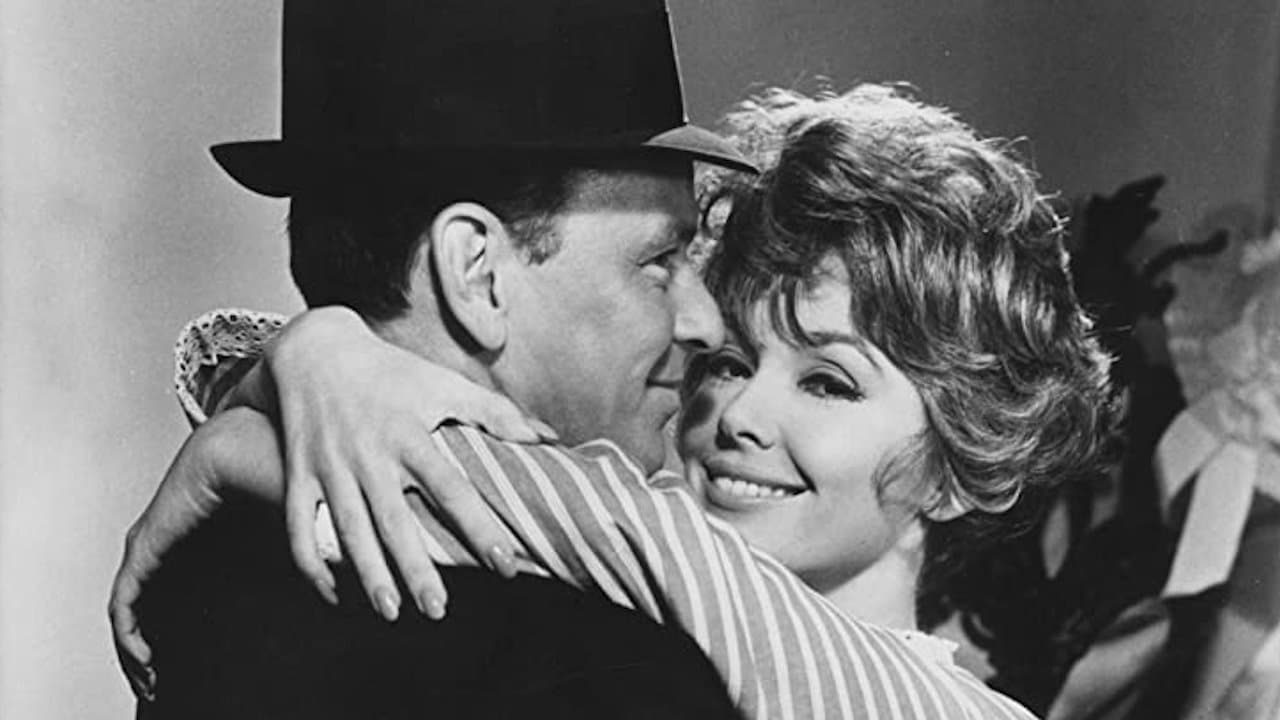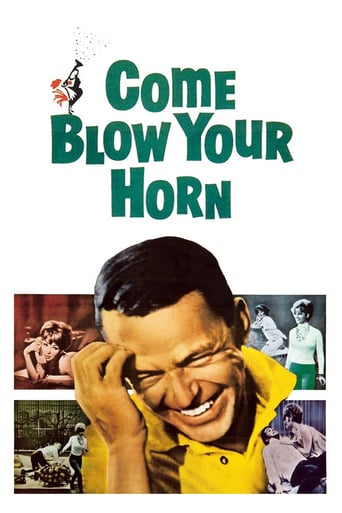Whitech
It is not only a funny movie, but it allows a great amount of joy for anyone who watches it.
Humaira Grant
It’s not bad or unwatchable but despite the amplitude of the spectacle, the end result is underwhelming.
filippaberry84
I think this is a new genre that they're all sort of working their way through it and haven't got all the kinks worked out yet but it's a genre that works for me.
Orla Zuniga
It is interesting even when nothing much happens, which is for most of its 3-hour running time. Read full review
elshikh4
Well, let me see. This is a comedy without any comedy. This is one of the worst movies had (Neil Simon)'s name on it ever. And this is the 1960s' most theatrical cinema I've seen.Come to think of it, the conversations are too long and not even droll or try to be. (Bud Yorkin)'s direction is anything but cinematic. Moreover, (Lee J. Cobb) was four years older than (Frank Sinatra), and he played his father !. Not to mention that (Sinatra) himself as the bachelor playboy was 48 years old while his brother, Tony Bill, was 23 (Yes, 25 years between them !). I believe that Jill St. John is fiery sexy, though here she was boring !. (Sinatra) does an imitation of President Kennedy, and Dean Martin appears in dull cameo; they seem like inside jokes for Sinatra so his fellows ! And the title? Sorry, but I have to suspect a double meaning where the other one is lewd; as it's harmonizing with the 1960s' free swinging spirit, and the era's boldness's limits. And even if, the movie as a whole fails on the level of being a sex comedy, or sexy, or comic ! This is a memory from what looks now as a far faraway galaxy. It was lovely age, but (Come Blow Your Horn) is not its best, or an example for its entertaining works. Seeing it in the 2000s is a history lesson more than a nostalgic installment. To assure how even at those classic days, there were weak movies and with big names. Yet at least they were making them that polished (the movie had nominated for the Oscar of the Best Art Direction-Set Decoration, Color). Anyway thanks to the TV that keeps transforming the "forgettable" into "unforgettable".So what's here to love? The title's song, it's clever and I loved it, so the music.
edwagreen
Those words were uttered by Molly Picon in this hilarious film. "Come Blow Your Horn" deals with a swinging bachelor Frank Sinatra and his kid brother, Tony Bill, who is trying to follow in his footsteps.Lee J. Cobb proved his adeptness at comedy in this one by his constant making reference to Sinatra as a bum for not being married. Note the surprise in his face when Sinatra ultimately says yes when Cobb again confronts him. He and Picon are the absolute best senior citizen couple in this hysterical film. The chemistry between these 2 characters, both of whom appeared on the Yiddish stage during their respective careers, is great. Absolutely amazing to me that Picon and especially Cobb were not nominated in the supporting category. Their portrayals of the typical Jewish couple dealing with their sons is hilarious. Sinatra, as the swinging bachelor, is great. The part was made for him. He is very well matched by Tony Bill, his kid brother, who is emulating his brother and getting into the latter's lifestyle very quickly. Picon is very funny in the scenes answering the telephones. No wonder she was the perfect Yenta in "Fiddler on the Roof" 8 years later. Lee J. Cobb produces a miracle here. Long regarded as an outstanding dramatic actor, he turns in an incredibly outrageous performance as the beleaguered father.Bill later went on to direct films. Look for Phyllis McGuire in a brief appearance as a buyer for Neiman-Marcus.
theowinthrop
If you look carefully at "Come Blow Your Horn" you will see it is a two set play that was expanded for this funny movie version. The two sets are the home of Mr. and Mrs. Baker and Buddy in Yonkers, and the apartment used by the older Baker boy Alan as his swinging singles pad. Most of the film is concentrated in those sets, except for scenes involving Alan taking Buddy under his wing to properly groom him, scenes with Barbara Rush outside the apartment (one briefly showing her apartment), and scenes involving Alan and the Eckmans (Dan Blocker and stiletto heeled Phyllis Maguire). Of the scenes outside the apartment, the two best are Alan's meeting with Mr. Eckman, and it's sequel at a restaurant, involving a raw steak and a bum (who turns out to look very familiar). Simon is one of the leading American dramatists of the 20th-21st Century, certainly the most successful comic dramatist. Seeing "Come Blow Your Horn" you see certain themes appearing for the first time. The twisted relationship of the two brothers, who do love each other but find they get on each other's nerves (as Buddy slowly overtakes the older Alan as a hipster). It is similar to the relationship of the brothers in "Brighton Beach Memoirs" and "Broadway Bound" (especially in he second play, where a real argument between the brothers breaks out). The question of relatives with sleazy or questionable activities like Alan's sexual escapades, comparable to the mobster brother in "Lost In Yonkers" or the embezzler, long-lost father in "Max Dugan Returns". The father losing the respect of his sons (found in the ranting Mr. Baker) is similar to the position of the father in "Broadway Bound", who has discovered his sons have reduced him to a comic stereotype in a sketch they sold a radio comedy show. The very fact that the Baker brothers become roommates who get on each other's nerves in an apartment is a constant thread in Simon's plays: "Barefoot In The Park (newliweds); "The Odd Couple" (and it's variation and sequel), "The Sunshine Boys" (in the rehearsal scene and in the conclusion where both Al and Willie seem headed for the old actor's home), even "Plaza Suite" (how three couples act together over the course of one year in a hotel suite). Simon is a master of building humorous tension out of trivialities. In "The Sunshine Boys" just setting up furniture to do a scene both vaudevillians can do in their sleep is frustrating as both see the furniture differently. In "Come Blow Your Horn", when Alan tells off buddy that his swinging lifestyle is going too far, he also mentions that he should keep his hands off Alan's fig newtons!Despite the claustrophobia of the sets limitations "Come Blow Your Horn" is a funny movie, benefiting from the performances of Sinatra, Jill St. John, Lee J. Cobb (usually a master of straight drama, here quite funny), and the glorious Molly Picon. One wishes more of Dan Blocker could have been used, but what was used was quite effective. There is an odd moment in the latter part of the film, connected to a party that Buddy throws, and a hypnotized guest blaming Alan for failing to support an education bill. Alan does an imitation of President Kennedy to reassure the woman. No doubt Sinatra felt it was a good imitation.It was meant to be funny, but now seems macabre.
bkoganbing
This Neil Simon comedy, debuted on Broadway two years earlier, minus the song and a few characters and starred Hal March, Warren Berlinger, Lou Jacobi, and Pert Kelton. It had a respectable run for about a year and Frank Sinatra must have recognized a property tailor made for him when he saw it.The eternal problem with filming plays is how to get them out of the theatrical confines and use the scope the movie camera offers. Primarily this is done with a Sinatra song with the movie title where he lectures kid brother Tony Bill that life ain't a dress rehearsal. Sammy Cahn, who put more words in Frank Sinatra's mouth than any other lyricist, put some of his best work into play here. It's a great Sinatra song and maybe it's inclusion qualifies Come Blow Your Horn to be a musical.Lee J. Cobb and Molly Picon are the quintessential Jewish parents and they are grand. Cobb was a very underrated actor and an unhappy man because of his experience with the House Un-American Activities Committee. Sinatra purportedly befriended him and helped him over a few rough patches. Molly Picon brought about 50 years of experience to her part as Frankie's mom. She was fresh from a Broadway triumph in Milk and Honey. She started out as a child in the Yiddish Theatre and was only now breaking out into a wider audience. She has a very funny scene alone in Sinatra's bachelor pad, trying to answer several phones looking for a pencil to take a message with disastrous consequences.The women here are an eyeful, Phyllis McGuire, Barbara Rush, and Jill St. John and Sinatra's involved with all of them. I won't tell you which one he ends up with, but I think you'd figure it out. I think most of Frankie's fans would settle for any one of them.Life imitates art and the real life Sinatra unlike his character Alan Baker didn't really settle down until fourth wife Barbara Marx married him.There's a lot of similarities with the earlier Sinatra comedy, The Tender Trap. It's ground gone over before, but it's good topsoil.A Quintessential Sinatra film, a must for fans of the Chairman of the Board.

